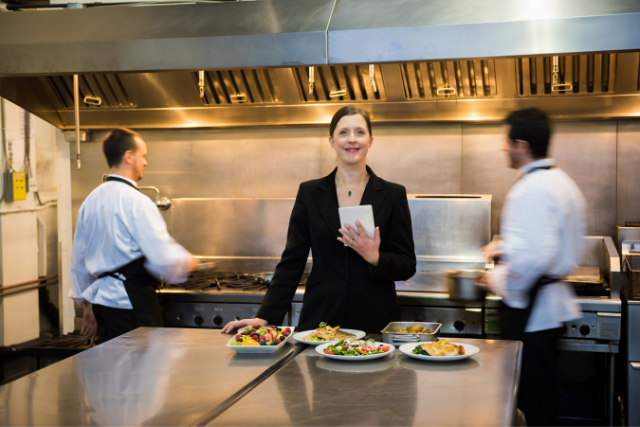
Among the many programs designed to prepare future culinary professionals, the Diploma in Culinary Arts & Technology Management stands out for its comprehensive approach. Offered by CCA Manila, this course blends practical kitchen training with food service management education.
The curriculum develops expertise in professional cooking techniques, food safety, sustainable practices, and a broad mix of Filipino regional and international cuisines. With so many areas included, graduates are well-prepared for industry demands, a fact reflected in the program’s strong job placement rate of 84%.
So, what kinds of careers open up with training in Culinary Arts & Technology Management?
Professional Kitchen Roles
One of the most direct outcomes of completing a Diploma in Culnary Arts and Technology Management is the opportunity to step into professional kitchen roles. Many graduates start as line cooks, working their way through the ranks in busy kitchens. Skills developed during training—such as knife handling, advanced cooking methods, and food safety—become second nature on the job.
Over time, experience in high-volume restaurants, hotels, or catering companies can lead to advancement as chef de partie or even sous chef. Some choose the pastry or baking route, focusing on desserts and breads, and develop a unique specialty in the culinary world.
Restaurant and Food Business Management
A background in culinary arts and technology management is also valuable for those drawn to restaurant management or entrepreneurship. Running a successful kitchen involves more than recipes and technique. The ability to manage food costs, supervise teams, and ensure consistent quality sets strong managers apart.
Some graduates become assistant managers or restaurant supervisors, while others open their own food businesses, such as a café, bakery, or catering service. Management skills learned in the program help navigate the day-to-day demands of business, from staffing to supplier relations. Earning a Culinary Arts and Technology Management Diploma makes it easier to adapt to varied challenges.
Corporate and Institutional Food Service

The food industry extends well beyond restaurants. Professionals are needed to deliver large-scale dining experiences in hotels, resorts, schools, cruise ships, and corporate cafeterias. Some graduates move into these settings, managing kitchen operations for hundreds or thousands of guests daily.
Responsibilities might include menu planning for diverse diets, food safety oversight, and efficient workflow design. In these roles, leadership and organization matter as much as culinary skill.
Product Development and Culinary Innovation
For those interested in food trends and creativity, product development offers another path. Companies in food manufacturing, research, or development departments often look for people who understand culinary techniques and consumer preferences.
In a test kitchen, graduates might help create new menu items, develop recipes for packaged foods, or experiment with sustainable ingredients. Innovation is highly valued, especially as the industry responds to changing consumer tastes and dietary needs.
Training, Teaching, and Consultancy
Some professionals discover a passion for teaching, passing culinary skills to others. Graduates may find opportunities at a Culnary Arts and Technology Management School, technical college, or as corporate trainers, designing programs to sharpen the abilities of kitchen staff. Others choose to work as consultants, helping restaurants or food businesses improve operations, update menus, or comply with industry standards.
Pre-Boarding and Application Requirements
Before starting the Diploma in Culinary Arts and Technology Management at CCA Manila, applicants participate in the Kitchen Discovery Course (KDC). This initial step introduces the professional kitchen setting and gives a sense of daily culinary life. A written examination is part of the process for Senior High School applicants, helping the program assess each applicant’s readiness for hands-on training and academic study.
Hands-On Experience

Real-world application is built into the program. Students participate in campus-based dining services, assist in catering functions, join culinary tours, and engage with industry professionals through organized events. These experiences reinforce classroom learning and give students a clear view of how service standards, timing, and coordination play out in hospitality settings..
Tuition Payment Options
Flexibility in tuition payment is offered to make culinary training more accessible. Enrollees can pay for the entire two-year program up front, making planning simple. Others might prefer annual payments, breaking tuition into two manageable installments. For those who value more incremental options, payment per level is available, with each year divided into five levels. This range of choices helps accommodate different financial circumstances and personal preferences, so more aspiring culinary professionals can pursue training at CCA Manila.
Build Your Career With Culinary Arts & Technology Management
Earning a Diploma in Culinary Arts and Technology Management prepares students to enter modern hospitality roles. The industry values consistency, coordination, and the ability to keep pace in real service settings. The program focuses on practical training and structured routines that reflect how professional kitchens and food operations run.
At CCA Manila, students gain the experience and habits needed to perform with confidence from the start. Have questions or ready to get started? Reach out or apply now to see where your training can take you.
